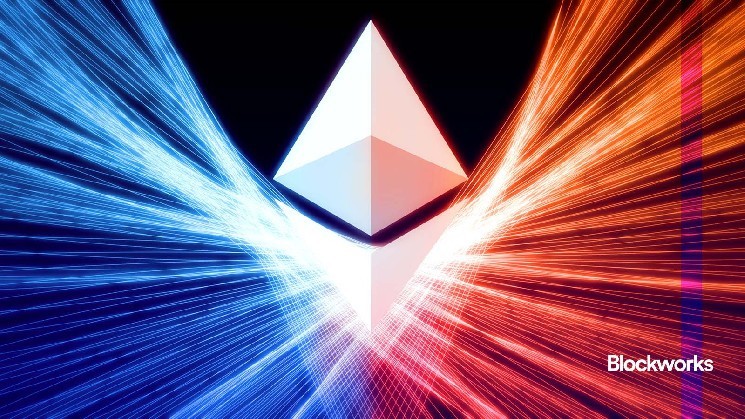Ethereum devs mark milestone ahead of Devcon

This is a segment from the 0xResearch newsletter. To read full editions, subscribe.
It started with an understated “woo-hoo” and a laugh. The latest Ethereum All Core Developers (ACD) call marked a milestone for being the 200th such meeting.
As Galaxy’s Christine Kim noted on X, “[W]hat’s cool about these calls is that through the years they’ve remained open, transparent and accessible for anyone to join and listen in on. [A]lso, devs still rely on these calls to act as a critical forcing function for making key governance decisions about [E]thereum.”
As usual, developers discussed key updates around testing networks for the upcoming Pectra upgrade, and a host of other topics in the world of Ethereum technical planning.
Unusually, several of the participants were in the same room together in Thailand, where the largest annual Ethereum conference, Devcon, is set to be underway next week.
A highlight of the call was the launch of Mekong, a new short-term devnet created to support Devcon hackathons. Built on the Devnet 4 spec, Mekong is now live, giving developers a focused environment for innovation ahead of Ethereum’s upcoming changes.
“Mekong is meant to be a playground for wallet developers to experiment with UX changes and for stakers to gain confidence in the upcoming changes,” according to a blog post announcing the testnet.
Devnet 4 will remain accessible for further testing over the next few weeks so as to maintain flexibility for developers experimenting with the evolving protocol.
The conversation also covered recent proposed updates affecting core functionality, specifically in EIPs 7002 and 7521. Minor modifications to these contracts aim to improve user-friendliness, notably by helping users avoid accidental overpayments. While the contracts are currently under audit, developers were asked to review these updates asynchronously, a process that will likely continue after Devcon.
Devs further explored ways to streamline testing by isolating specific parts of the fork — specifically EOF and PeerDAS — for independent activation. Nethermind’s “chainspec” configuration option already supports fine-grained control for EIP activation, allowing teams to toggle individual EIPs for testing. However, concerns arose over the complexity of this approach, as some teams prefer Geth’s simpler fork activation model.
A consensus on a universal approach remains unreached, with some developers noting that fine-grained control could lead to unpredictable interactions if not managed carefully.
Another central issue during the call was Ethereum’s growing data footprint and ways to handle historical data more efficiently. EIP-7801 — aka eth/70 or Sharded Blocks Protocol — was proposed as a short-term solution to reduce nodes’ storage requirements. This measure would ease the data burden until Portal, a more comprehensive data solution, becomes fully integrated. While some teams favor a universal standard for history retention, others advocate for a client-specific approach to managing storage.
EIP-7610 also featured in the discussion, as it aims to resolve certain edge cases in contract deployment. While the proposal is close to finalization, some clients reported challenges in implementation. As a result, an alternative design is now being explored, with a new proposal expected soon.
Devcon provides a rare opportunity for a major cohort of core developers to get together in person and hash out unresolved issues. Ethereum developers are advancing on multiple fronts to optimize infrastructure and meet the scaling demands of dapps and users, at a time when the conventional Twitteratti narrative is that the second most valuable blockchain network is falling behind rivals.





 Bitcoin
Bitcoin  Ethereum
Ethereum  Tether
Tether  Dogecoin
Dogecoin  USDC
USDC  Cardano
Cardano  TRON
TRON  Chainlink
Chainlink  Stellar
Stellar  Hedera
Hedera  Bitcoin Cash
Bitcoin Cash  LEO Token
LEO Token  Litecoin
Litecoin  Cronos
Cronos  Ethereum Classic
Ethereum Classic  Monero
Monero  Dai
Dai  Algorand
Algorand  OKB
OKB  Cosmos Hub
Cosmos Hub  Stacks
Stacks  Theta Network
Theta Network  Gate
Gate  Maker
Maker  KuCoin
KuCoin  Tezos
Tezos  IOTA
IOTA  NEO
NEO  Polygon
Polygon  Zcash
Zcash  Synthetix Network
Synthetix Network  Tether Gold
Tether Gold  TrueUSD
TrueUSD  Dash
Dash  Holo
Holo  Zilliqa
Zilliqa  0x Protocol
0x Protocol  Enjin Coin
Enjin Coin  Qtum
Qtum  Basic Attention
Basic Attention  Siacoin
Siacoin  Ravencoin
Ravencoin  Bitcoin Gold
Bitcoin Gold  Decred
Decred  NEM
NEM  Ontology
Ontology  DigiByte
DigiByte  Nano
Nano  Hive
Hive  Status
Status  Huobi
Huobi  Lisk
Lisk  Waves
Waves  Steem
Steem  Numeraire
Numeraire  Pax Dollar
Pax Dollar  BUSD
BUSD  OMG Network
OMG Network  Ren
Ren  Bitcoin Diamond
Bitcoin Diamond  Bytom
Bytom